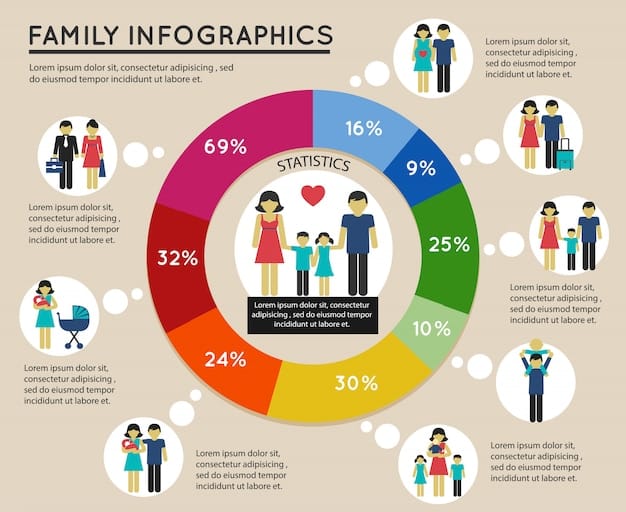Homeschooling Surge: US Education Trends & New Data

The rise of homeschooling in the US is marked by a significant increase in participation, influenced by factors like parental concerns over school environment and a desire for personalized education, as highlighted by recent data and trends.
The landscape of education in the United States is undergoing a significant shift. A growing number of families are opting out of traditional schooling and embracing homeschooling as a viable alternative. Understanding the rise of homeschooling: new data and trends shaping education in the US is critical to understanding this change.
Understanding the Homeschooling Phenomenon
Homeschooling, once a fringe educational choice, has moved into the mainstream. This section delves into the definition of homeschooling, its historical context in the United States, and the recent surge in popularity.
What is Homeschooling?
Homeschooling is the education of children at home, typically by parents or guardians. It allows for a personalized curriculum tailored to the individual child’s needs, interests, and learning style. This method contrasts significantly with traditional schooling, which follows a standardized curriculum within a classroom setting.
A Brief History of Homeschooling in the US
Homeschooling has existed in various forms throughout American history, often as the primary means of education in rural communities. However, it gained renewed momentum in the latter half of the 20th century, driven initially by religious and philosophical motivations. Over time, the reasons for choosing homeschooling have diversified, reflecting a broader range of parental priorities.

Several factors account for the recent growth of homeschooling:
- Increased awareness and acceptance of homeschooling as a legitimate educational option.
- Availability of resources and support networks for homeschooling families.
- Growing dissatisfaction with the perceived shortcomings of the traditional public school system.
- Desire for greater control over the content and environment of their child’s education.
The rise of homeschooling represents a significant change in the educational landscape, reflecting both the evolving needs of families and the increasing availability of alternative educational pathways.
New Data on Homeschooling Growth
Examining the quantitative evidence of homeschooling trends is crucial to fully grasp the scope of its expansion. This section presents recent statistics and data that illustrate the surge in homeschooling rates throughout the United States.
Recent Statistics and Growth Rates
Data from the U.S. Census Bureau and the National Center for Education Statistics (NCES) reveals a significant increase in homeschooling rates in recent years. The most substantial surge occurred during the COVID-19 pandemic, but homeschooling rates have remained elevated even after schools fully reopened.
Demographic Trends in Homeschooling Families
Analyzing demographic data provides insights into the types of families choosing to homeschool. While homeschooling families were once primarily concentrated in specific religious or ideological groups, they now represent a broader cross-section of American society.
Regional Variations in Homeschooling
Homeschooling rates vary significantly across different states and regions in the US. Factors such as state regulations, access to resources, and cultural norms influence the prevalence of homeschooling in specific areas.

Here are some examples of the latest data insights on homeschooling in the US:
- In 2020, homeschooling rates more than doubled in some states.
- Homeschooling is growing in popularity among Black and Hispanic families.
- Some states offer financial assistance or tax credits to homeschooling families.
- Parental education level and income play a role in homeschooling choices.
The data clearly demonstrates the significant growth of homeschooling and its increasing adoption across diverse demographic groups and geographic regions.
Motivations Behind the Decision to Homeschool
Understanding why more families are choosing to homeschool requires examining the motivations that drive this decision. This section explores the top reasons parents cite for homeschooling their children.
Academic Concerns and Dissatisfaction with Traditional Schools
Some parents are dissatisfied with the academic quality or curriculum offered by traditional schools. They may feel that their child’s needs are not being met in a classroom setting or that the curriculum is not challenging enough.
Safety and School Environment
Concerns about safety, bullying, and the overall school environment are also significant motivators for homeschooling. Parents may worry about their child’s physical or emotional well-being in a traditional school setting.
Personalized Learning and Individualized Attention
A major advantage of homeschooling is the ability to provide personalized learning experiences tailored to the child’s individual needs, interests, and learning style. Parents can adapt the curriculum and teaching methods to best suit their child’s unique strengths and weaknesses.
Flexibility and Customization of Curriculum
Homeschooling allows for a highly flexible and customizable curriculum, which can be adapted to the child’s interests, learning style, and future goals. This level of customization is often not possible in traditional schools.
Parents may choose to homeschool for diverse reasons:
- To provide religious or moral instruction.
- To accommodate a child’s special needs or learning disabilities.
- To offer a more challenging or accelerated academic program.
- To provide a safer or more nurturing learning environment.
Ultimately, the decision to homeschool is driven by a complex interplay of factors, reflecting the unique circumstances and priorities of each family.
The Impact of Homeschooling on Student Outcomes
Assessing the effectiveness of homeschooling requires an examination of its impact on student outcomes. This section presents research findings and insights into the academic, social, and emotional development of homeschooled children.
Academic Achievement and Standardized Test Scores
Studies have consistently shown that homeschooled children perform well on standardized tests, often exceeding the scores of their traditionally schooled peers. This suggests that homeschooling can be an effective method for academic achievement.
Socialization and Social Development
One common concern about homeschooling is its potential impact on socialization. However, research suggests that homeschooled children are actively involved in their communities and develop strong social skills through various extracurricular activities and social networks.
College and Career Readiness
Homeschooled students are increasingly gaining acceptance into colleges and universities. Their unique educational experiences and self-directed learning skills often make them well-prepared for higher education and future careers.
The impact of homeschooling:
- Graduates can perform well academically, surpassing peers on standardized tests.
- Homeschoolers are often involved in extracurricular activities in their local communities.
- Many report positive social experiences through homeschooling networks.
- Homeschool alumni are increasingly successful in higher education and careers.
While individual results may vary, homeschooling can produce positive outcomes for students who are nurtured in environments that foster unique learning styles.
Resources and Support for Homeschooling Families
The availability of resources and support networks is crucial for successful homeschooling. This section explores the diverse resources available to homeschooling families, including curriculum providers, support groups, and online communities.
Curriculum Providers and Educational Materials
A wide range of curriculum providers offer comprehensive educational materials for homeschooling families, covering various subjects and grade levels. These resources can help parents create a structured and engaging learning experience for their children.
Homeschooling Support Groups and Co-ops
Homeschooling support groups and co-ops provide valuable opportunities for families to connect, share resources, and participate in group learning activities. These social networks can offer emotional support and practical assistance to homeschooling parents.
Online Communities and Virtual Resources
Online communities and virtual resources have become increasingly important for homeschooling families, providing access to information, support, and educational materials from anywhere in the world. These platforms facilitate communication and collaboration among homeschoolers.
Here are some beneficial resources:
- Online platforms that offer course material and lesson plans, such as Khan Academy.
- Local and regional homeschooling support groups that arrange meetups, classes, and field trips.
- Bookstores and educational supply stores that provide curriculum guides.
- Websites and blogs that offer advice, reviews, and encouragement.
Access to a support infrastructure and relevant educational material can determine the success of a homeschooling program.
The Future of Homeschooling in the US
As homeschooling continues to grow, it’s important to consider its potential impact on the future of education. This section explores the anticipated trends and developments in homeschooling, as well as its relationship with traditional schooling.
Anticipated Trends and Developments
Several trends are likely to shape the future of homeschooling, including the increasing integration of technology, the rise of hybrid homeschooling models, and the growing demand for personalized learning experiences.
The Relationship Between Homeschooling and Traditional Schooling
While sometimes positioned as opposing forces, homeschooling and traditional schooling can complement each other. Many families utilize a combination of homeschooling and traditional school programs to meet their children’s educational needs.
Policy and Regulation of Homeschooling
The regulation of homeschooling varies widely across different states. As homeschooling becomes more prevalent, policymakers will need to consider its role in the broader educational landscape and develop appropriate regulations.
Looking ahead:
- Educational strategies are likely to focus increasingly on student-centered learning.
- Technology will play an expanded role in homeschooling and traditional settings.
- Policy will need to be continually updated to account for these modern approaches.
- The future suggests ongoing growth, adaptation, and integration within our education systems.
Homeschooling is predicted to become deeply intertwined with broader options. It shows the adaptation of education practices to fit individual circumstances and preferences.
| Key Point | Brief Description |
|---|---|
| 📈 Growth in Homeschooling | Significant increase in US, influenced by various factors. |
| 🍎 Motivations | Academic concerns, safety, personalized learning. |
| 📚 Student Outcomes | High academic achievement, community involvement. |
| 🌐 Future & Trends | Tech integration, hybrid models, personalized learning. |
Frequently Asked Questions
▼
Homeschooling rates saw a significant increase during the COVID-19 pandemic. Although numbers have stabilized somewhat, they generally remain higher than pre-pandemic levels, reflecting an expanded interest in alternative educational methods.
▼
Parents opt for homeschooling due to concerns about school safety and the overall environment, a desire for a more customized and individualized learning experience, and dissatisfaction with the quality or content of the traditional public education system.
▼
Research indicates that homeschooled students often excel academically, frequently outperforming their peers in traditional schools on standardized tests. This superior performance suggests homeschooling is an effective educational method.
▼
Homeschooling families can find a variety of supportive resources, including comprehensive curriculum providers, local support groups and cooperatives offering in-person connections, as well as rich online communities that provide guidance, reviews, and shared learning materials.
▼
The future of homeschooling in the US looks promising, with trends indicating greater integration of technology, an increase in hybrid schooling models, and a growing emphasis on personalized learning experiences. This evolution suggests homeschooling will continue growing.
Conclusion
The rise of homeschooling in the United States signifies a profound transformation in the approach to education. Driven by various factors, including academic concerns, the desire for personalized learning, and safety considerations, homeschooling has become a mainstream alternative for many families. As homeschooling continues to evolve, incorporating technology, hybrid models, and personalized strategies, it is poised to play an increasingly important role in shaping the future of education in the US.





